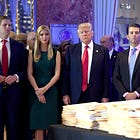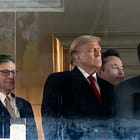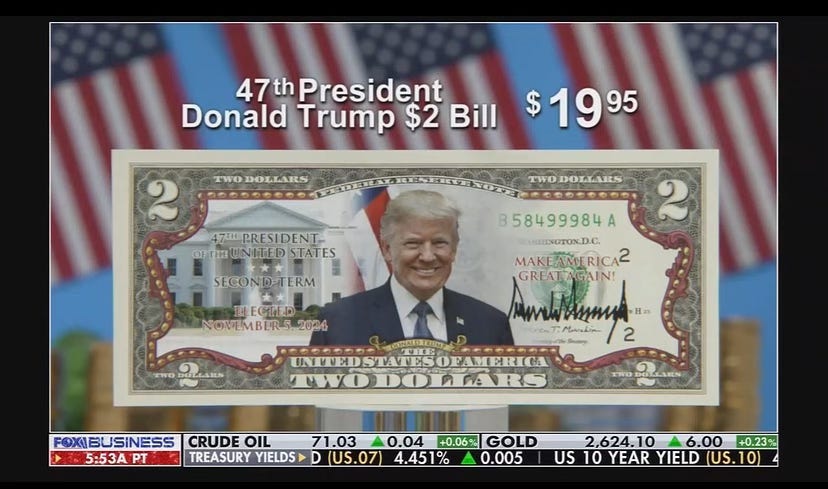Jimmy Carter's anti-corruption legacy is being desecrated
The contrast with Trump reflects how far our standards have fallen.
🍑🍑🍑 With corporate outlets obeying in advance, independent political coverage will be more vital than ever in 2025. Public Notice is made possible by paid subscribers. If you aren’t one already, please click the button below and become one to support our work. 🍑🍑🍑
There are many obvious differences between the late Jimmy Carter and Donald Trump, but perhaps the most jarring is how they managed their family business when they were elected president.
Partly in response to the criminality of the Watergate era, Carter set a new standard for presidential rectitude by putting his peanut business into a blind trust. President-elect Trump, by contrast, isn’t even going through the motions of pretending to divest from his business interests to avoid conflicts of interest ahead of his second term. With help from his GOP enablers and voters who can’t seem to be bothered to give a damn, Trump has normalized White House corruption to an extent that would’ve been unthinkable not so long ago.
So as the tributes to Carter roll in following his passing last weekend and ahead of his state funeral next week, it’s worth reexamining why a commitment to presidential ethics was important when he took office in 1977 — and why it still should matter today as the most corrupt president in American history prepares to retake power.
Shortly before his inauguration in 1977, Carter transferred his holdings from his peanut warehouse business into a blind trust. He’d retain ownership of the property, but the trust agreement would "insure that he will not benefit financially from agricultural policy decisions that he may make as President.” His business was valued at about $1.6 million, or $8.8 million in 2024 dollars — hardly a vast enterprise, but nonetheless, Carter stated in the trust documents that he “wants the trustee to arrange the assets of the trust so that no one should reasonably assert that [his] actions as President were motivated by a desire to foster his own personal monetary gain or profit."
Four decades later, Trump demonstrated no such scruple. Sure, he initially suggested that he’d follow Carter’s example, tweeting on November 30, 2016, “While I am not mandated to do this under the law, I feel it is visually important, as President, to in no way have a conflict of interest with my various businesses.” However, like most of what Trump says, this was a lie. He announced in January 2017 that he wouldn’t divest from his businesses and instead would simply hand over control temporarily to his sock puppet sons.
A note from Aaron: Working with fantastic contributors like Stephen takes resources. If you aren’t already a paid subscriber, please sign up to support our work.
Last January, at a Fox News town hall, Trump blew off any concerns about keeping his business interests should he return to the White House.
“If I have a hotel and somebody comes in from China, that’s a small amount of money,” Trump said, before promoting his hotel chain some more. “I was doing services for that. People were staying in these massive hotels, these beautiful hotels, and they stayed there and they paid. I don’t get $8 million for doing nothing.”
This should come as no surprise. Carter considered the presidency a form of public service, for which sacrifice was required. For Trump, the White House is merely another means of self-aggrandizement.
A tale of two presidencies
When Carter was elected president in 1976, he prioritized restoring public trust in government, which had diminished thanks Watergate and its aftermath, including President Ford’s pardon of Nixon.
Carter wasn’t shy about calling out the corruption and cronyism in Nixon’s administration. During a Face the Nation interview, he claimed a major problem with foreign policy was that Nixon’s ambassadors to South America, Central America, and Europe were “not qualified to be diplomats for this country. They are all appointed as a political payoff … they are appointed because there are political interrelationships and not because of quality. Now, the last time I was in Europe, for instance, out of 33 ambassadors who served in the whole European theatre, only three of them were professional diplomats. The others were appointed for political reasons.” (Watch below.)
Trump is plumbing even greater depths of cronyism with his appointments. He recently selected his son-in-law Jared Kushner’s father and fellow convicted felon Charles Kushner for ambassador to France. He also picked Kimberly Guilfoyle as ambassador to Greece. As Carter lamented about Nixon’s ambassador picks, it’s not clear Guilfoyle even “speaks the language” or possesses any relevant qualifications beyond the fact she dated Trump’s eldest son, Don Jr. Trump even installed his unqualified daughter-in-law Lara Trump as head of the Republican National Convention. Like his idol Andrew Jackson, Trump fully embraces the spoils system.
Carter said on the campaign trail, “Everyone who serves in a position of policymaking ought to reveal to the public his or her financial holdings, where his or her riches are invested, and where his or her special interests are, so that no conflict with the public interest will exist.” And this tough, somewhat populist rhetoric as a candidate wasn’t just talk, either.
Although the president and vice president are technically exempt from conflict of interest laws, Carter believed more was required from those who held such power. As president, he imposed strict ethical guidelines within his administration. This included financial disclosure rules for his appointees to “remove any possibility of hidden conflicts of interest.” He told Congress in May 1977, “I have obtained a commitment from these officials to adhere to tighter restrictions after leaving government, in order to curb the ‘revolving door’ practice that has too often permitted former officials to exploit their government contacts for private gain.”
Carter said that “no gifts of value should ever again be permitted to a public official” and that “a report of all minor personal gifts should be made public.”
Conversely, a House Democratic oversight investigation revealed in 2023 that the Trump family consistently failed to “disclose gifts from foreign government officials while in office, as required by the Foreign Gifts and Decorations Act.” The more than 100 foreign gifts that were never properly reported included golden golf clubs from the Japanese prime minister, swords and daggers from Crown Prince Mohammad bin Salman of Saudi Arabia, and a “larger-than-life” portrait of Trump from the President of El Salvador.
Trump’s corruption as president was far-reaching. He held himself and those close to him to no discernible standard, and he turned the presidency into just another product offering from Trump Incorporated. It’s a revealing difference with Carter, whose high ethical standards carried a tremendous personal cost.
The peanut farmer vs. the wannabe robber baron
Carter had already sacrificed a great deal to his run his family business. His parents, Earl and Lillian Carter, owned a peanut farm, warehouse, and a store outside Plains, Georgia. He was arguably a far better businessman than young Trump, who relied heavily on his wealthy father’s assistance and still went bankrupt at least six times.
As a teenager, Carter received an acre of his father’s farmland, and he grew, packaged, and sold peanuts. When the price of cotton crashed, he bought up excess bails and sold them for a profit. He used that money to purchase some tenant housing that he rented out to farm workers through his time in college.
Carter received an appointment to the Naval Academy in 1943, and he married Rosalynn Carter in 1946. The Carters lived in Virginia, Hawaii, Connecticut, New York, and California during his deployments. For a couple who’d grown up in the same small Georgia town, this travel was extensive, almost cosmopolitan.
In 1953, Carter started a six-month course in nuclear power plant operation at Union College in Schenectady, New York. He planned to eventually work on the USS Seawolf, which was intended to become the second US nuclear submarine. But his plans changed permanently when his father died that summer. The family farm was in decline and might not have survived, which would’ve devastated Carter’s mother. So, much like George Bailey, Carter put his personal ambitions aside and returned home to run his family business. This was a difficult decision, especially for Rosalynn, who missed the travel and financial security of their military life. She’d said returning to Plains felt like "a monumental step backward."
Carter’s first year harvest failed due to drought and he took out several lines of credit to stay afloat. However, with a lot of hard work and dedication, the business steadily improved under his leadership. He started growing peanut seed himself rather than buying and reselling certified seed like his father. He expanded the warehouse operation to include supplying liquid nitrogen, bulk fertilizer, and lime. He bought corn, provided custom grinding and mixing, and ginned cotton. His business also provided fire and casualty insurance.
After investing so much personal sweat equity and emotional equity into the business, it must’ve been difficult to fully step away, even just temporarily. However, Carter insisted on doing so, because he knew it was the right thing to do. His blind trust agreement required that his farm land was leased during his presidency at a fixed amount set in 1977 so he wouldn’t even appear to benefit from his administration’s farm policies.
Trump, on the other hand, didn’t hold himself to any such restrictions. He used the presidency to elevate his personal “brand,” and he actively promoted his own properties while in office.
During his first term, Trump shamelessly charged the Secret Service, the people assigned with keeping him alive, as much as $1,185 per night to stay at his properties when he traveled. That was more than five times the recommended government rate. And Republican political organizations dropped more than $3 million at Trump’s DC hotel, which was conveniently located just a few blocks from the White House.
Trump consistently thumbed his nose at the Constitution’s emoluments clause, which guards against foreign interests buying off a president. Revenue at his New York hotel surged in 2018 thanks to conveniently timed visit from the Crown Prince of Saudi Arabia. In 2019, Trump even tried to have his Doral resort selected as the site where world leaders would gather for the G7 summit.
Carter sold all his personal stock before entering the White House. Trump returns to office with a $3.76 billion stake in the social media company, Truth Social, that he still uses as one of his primary platforms for disinformation. After the election, when Trump posted of his shares, “I HAVE NO INTENTION OF SELLING,” Truth Social’s stock price soared, which directly benefitted him financially.
Yet Trump’s transition spokesperson and incoming press secretary, Karoline Leavitt, had the gall to tell the Washington Post, “Unlike most politicians, President Trump didn’t get into politics for profit — he’s fighting because he loves the people of this country and wants to make America great again.”
With Trump, gaslighting is policy. Trump made a fortune from his presidency. He raked in $2.4 billion during his first term, and there’s apparently no grift too small for him to slap his face on. For instance, his supporters can buy $2 bills bearing his likeness for the sucker’s price of $19.95 …
… and Trump has even recently dabbled in guitar sales.
Carter’s personal business suffered during his presidency. His blind trust placed an Atlanta law firm in full control of the business while he was in the White House. After he lost reelection to Ronald Reagan, his financial trustee informed the Carters that due to three years of drought and general warehouse mismanagement, they were now more than $1 million in debt. “We thought we were going to lose everything,” Rosalyn said in 2018.
At the time, Jimmy was 56 and Rosalyn was 53. Their financial setback had but one solution — they sold the family business that they once sacrificed so much to save. Carter started writing books (he’s rejected most speaking engagements) and they lived modestly in their Plains home, valued at $176,000. He devoted the rest of his life to philanthropy, through the Carter Foundation and Habitat for Humanity.
“We give money, we don’t take it,” Carter told The Los Angeles Times in 1989.
Of course, despite Carter’s high ethical standards and personal character, Americans denied him a second term in part due to inflation and a sense that he wasn’t in control of world events (sound familiar?). And the notion that voters care about ethics is belied by the fact a near majority just reelected Trump despite his blatant self-dealing and rejection of basic human decency. He’s likely to profit even more from his presidency during his second term, now almost fully unfettered from any true accountability.
But if America is to remain a democracy where leaders are accountable to voters, there will have to be a reckoning with the corruption Trump has normalized. And when that time comes, Jimmy Carter's example will endure.
That’s it for this week
We’ll be back with more Monday. If you appreciate today’s newsletter, please support us by signing up. Paid subscribers make PN possible.
Thanks for reading, and let me wish you a Happy New Year one last time!









Thank you for this in depth comparison between an ethical president (and compassionate human being) and a corrupt soon to be leader (I will never say that he is my president!)- I have always had the utmost respect for Jimmy Carter, for his integrity, for his leadership, for he truly walked the talk throughout his life. In a world of Trump may more Carters come to light!
Really appreciate this! Nice way to start 2025. More,please.